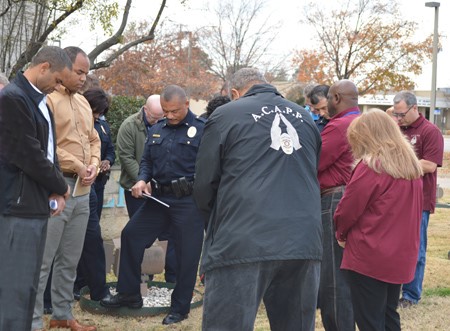Engaging Faith Leaders to Build Community Trust
The Task Force on 21st Century Policing offers recommendations for building trust and creating opportunities for working with the community to increase public safety. Highlights include: developing outreach programs to improve relations with the community, knowing and understanding various cultures and faiths of the community, and acknowledging issues within the community and working with citizens to increase public safety.
 The Arlington, Texas, Police Department has long prioritized engagement with all its community members. The department has a large and active volunteer unit that engages community members in unique ways. One key initiative is the Arlington Clergy and Police Partnership (ACAPP), which allows the department to engage with the community through direct outreach with faith leaders.
The Arlington, Texas, Police Department has long prioritized engagement with all its community members. The department has a large and active volunteer unit that engages community members in unique ways. One key initiative is the Arlington Clergy and Police Partnership (ACAPP), which allows the department to engage with the community through direct outreach with faith leaders.
The Arlington Clergy and Police Partnership was created in 2009 by former Arlington Police Chief, Theron Bowman, and Crime Prevention Officer Kimberly Fretwell to support the Arlington Police Department and enhance relationships between police officers and the surrounding community. ACAPP continues to expand, and has developed into a non-profit under the leadership of Chief Will Johnson. With 28 church pastors, imams, and other faith leaders, ACAPP brings various faiths and denominations together in one cohesive network.
ACAPP members complete a 12-week training program facilitated by the police department that enables clergy members to gain knowledge of police functions and procedures by observing interactions with the officers and community. The information learned through ACAPP training prepares members to take these messages to their communities. ACAPP members work in non-traditional roles, with a primary focus on community outreach and restoration. Activities include: hosting prayer vigils and community forums; providing support and counseling in crisis situations; and assisting in domestic situations. In the past the group has helped rebuild a house that was destroyed in a fire, provided funds for laundry services, and bought clothing and furniture for domestic violence victims.
ACAPP serves an important role in helping to support officers and reassure community members during critical incidents. When law enforcement located the body of a missing Muslim woman with dementia in an Arlington creek, information spread quickly throughout the community and family, friends, and neighbors gathered at the scene.
ACAPP board member Imam Mohamed Shakib was called to the scene to calm and disperse the crowd, so the police could continue their investigation. Imam Shakib reassured his community that everything would be fine and that officers would determine what happened to the woman. The police kept Imam Shakib informed regarding the investigation into the woman’s death, so he could relay information to his community.
Police continued to work closely with Imam Mohamed Shakib throughout the investigation, making sure to honor and respect the customs of the Muslim community. Because of this, the Muslim community gained considerable trust in the police department for their respect for Ramadan and the need to bury the dead 24 hours from the time of death.
The Arlington, Texas Police Department has demonstrated a genuine desire to build positive relationships with the members of their community through numerous outreach programs, especially Arlington Clergy and Police Partnership. ACAPP enables clergy members to effectively work together with police officers to ensure safety.
This blog post is part of a series highlighting best practices in advancing 21st century policing as part of the IACP Institute for Community-Police Relations. Arlington is one of fifteen sites selected for participation in the Advancing 21st Century Policing Initiative, a joint project of the COPS Office, CNA, and the IACP to highlight agencies who are actively embracing the principles in the President’s Task Force on 21st Century Policing.

 The Arlington, Texas, Police Department has long prioritized engagement with all its community members. The department has a large and active volunteer unit that engages community members in unique ways. One key initiative is the Arlington Clergy and Police Partnership (ACAPP), which allows the department to engage with the community through direct outreach with faith leaders.
The Arlington, Texas, Police Department has long prioritized engagement with all its community members. The department has a large and active volunteer unit that engages community members in unique ways. One key initiative is the Arlington Clergy and Police Partnership (ACAPP), which allows the department to engage with the community through direct outreach with faith leaders.The Arlington Clergy and Police Partnership was created in 2009 by former Arlington Police Chief, Theron Bowman, and Crime Prevention Officer Kimberly Fretwell to support the Arlington Police Department and enhance relationships between police officers and the surrounding community. ACAPP continues to expand, and has developed into a non-profit under the leadership of Chief Will Johnson. With 28 church pastors, imams, and other faith leaders, ACAPP brings various faiths and denominations together in one cohesive network.
ACAPP members complete a 12-week training program facilitated by the police department that enables clergy members to gain knowledge of police functions and procedures by observing interactions with the officers and community. The information learned through ACAPP training prepares members to take these messages to their communities. ACAPP members work in non-traditional roles, with a primary focus on community outreach and restoration. Activities include: hosting prayer vigils and community forums; providing support and counseling in crisis situations; and assisting in domestic situations. In the past the group has helped rebuild a house that was destroyed in a fire, provided funds for laundry services, and bought clothing and furniture for domestic violence victims.

ACAPP serves an important role in helping to support officers and reassure community members during critical incidents. When law enforcement located the body of a missing Muslim woman with dementia in an Arlington creek, information spread quickly throughout the community and family, friends, and neighbors gathered at the scene.
ACAPP board member Imam Mohamed Shakib was called to the scene to calm and disperse the crowd, so the police could continue their investigation. Imam Shakib reassured his community that everything would be fine and that officers would determine what happened to the woman. The police kept Imam Shakib informed regarding the investigation into the woman’s death, so he could relay information to his community.
Police continued to work closely with Imam Mohamed Shakib throughout the investigation, making sure to honor and respect the customs of the Muslim community. Because of this, the Muslim community gained considerable trust in the police department for their respect for Ramadan and the need to bury the dead 24 hours from the time of death.
The Arlington, Texas Police Department has demonstrated a genuine desire to build positive relationships with the members of their community through numerous outreach programs, especially Arlington Clergy and Police Partnership. ACAPP enables clergy members to effectively work together with police officers to ensure safety.
This blog post is part of a series highlighting best practices in advancing 21st century policing as part of the IACP Institute for Community-Police Relations. Arlington is one of fifteen sites selected for participation in the Advancing 21st Century Policing Initiative, a joint project of the COPS Office, CNA, and the IACP to highlight agencies who are actively embracing the principles in the President’s Task Force on 21st Century Policing.

